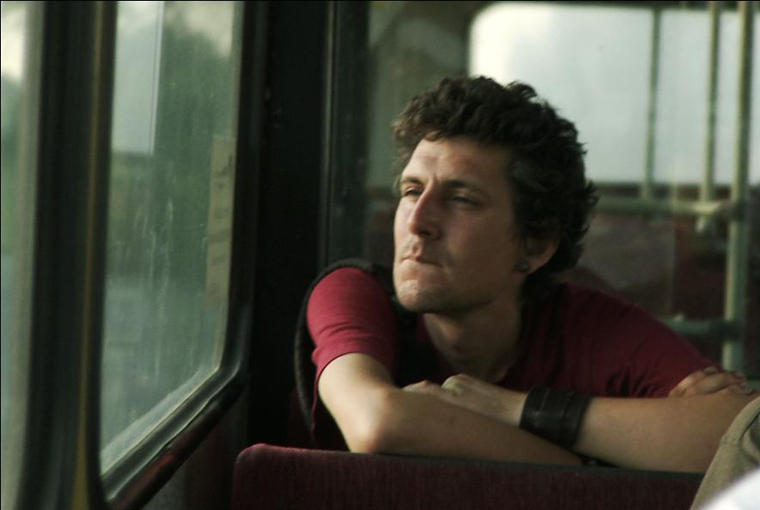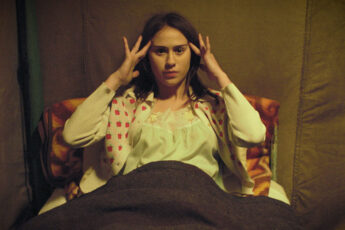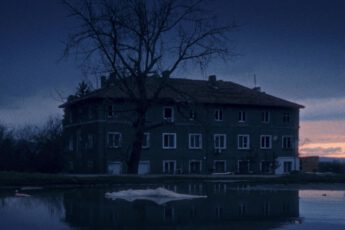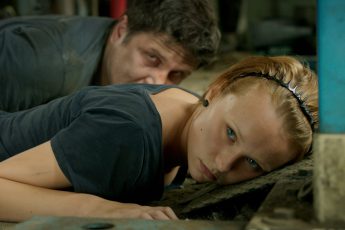The Lost Souls of Eastern Europe
Kamen Kalev’s Eastern Plays (Iztochni piesi, 2009)
Vol. 71 (January 2017) by Anna Batori
Kamen Kalev’s post-structuralist city-opus bears all the marks of a first feature: while offering a postmodern portrayal of Sofia, Eastern Plays undertakes the impossible task of telling Bulgaria’s whole post-system, socio-historical change in 90 minutes. This often turns into a narrative-aesthetic huddle, thus making it impossible to identify with the story. Had the young Bulgarian director wanted to say less about the current social situation of the country, Eastern Plays could have been a milestone of Eastern European cinema. Instead, it is a remarkable first try to draw attention to the fact that something is terribly rotten about the post-socialist region.
Though focused on the panel-jungle of Sofia, Eastern Plays enumerates all the problems that Bulgarian society has been facing in the past twenty years. Through the personal hi(story) of two brothers, Georgi (Ovanes Torosyan) and Itso (Christo Christov), Kalev depicts a post-socialist cityscape full of crime, corruption, xenophobia and capitalist exploitation. Itso, the elder sibling, is a drug-addict artist who spends his days drinking, walking and fighting his girlfriend, Niki (Nikolina Yancheva). Whereas Itso finds comfort in alcohol, Georgi is taken under the wings of a neo-Nazi gang that abuses foreigners in the city. Their ways meet when Georgi’s band attacks a Turkish family that is rescued by Itso, who witnesses the event. The young artist starts to date their daughter Işıl (Saadet Işıl Aksoy), while Georgi slowly veers away from the fanatic group.
When depicting the brothers’ everyday struggles, Kalev uses Sofia’s urban landscape as an emotive signifier for the physical as well as psychological transformation of the two men. This way, the Bulgarian capital becomes the outward manifestation of the siblings’ inner world and is depicted as a dilapidated, ruinous and worn-out prison where the young generation has no other option but to get into suspicious businesses and join various underground clubs. As the film suggests, the great socialist father figure that would keep the society together, has died, giving way to gangsters that, as new role models, only teach youngsters violent, inhuman and aggressive acts. As a result, Bulgarian society is decaying: men treat women as objects, families are torn apart, and alcoholism and drug addiction are ever-rising phenomena. Itso and Georgi constantly circulate around ruinous apartment dwellings as lost souls.
The lost soul as a metaphor for universal decay caused by capitalist transformation is later emphasized by Işıl, whose bar-monologue addresses modern people whose “souls got sick”. According to her, there is something utterly wrong in how the world works, but change is in the air and healers will come to cure us. Unfortunately, the whole setting of the scene is constructed in such a way that the words of the young Turkish girl have more of an ironic connotation. Itso does not react to the girls’ words and, instead of continuing to communicate in English, he starts to talk to her in Bulgarian, whereby the connection gets entirely lost. Accordingly, in the next scenes, they only walk along each other as two lost souls, calling the promised rescue into question.
Unfortunately without a coherent story, the film is made up of fragmented sequences that, instead of elaborating on the deeper conflicts that reside within Bulgarian society, only stretch the surface. Instead of inserting subjective scenes that would have made up for the silence of the characters, Kalev lets the boys’ environment talk, which turns the film into a long flânerie and city-portrayal. By not letting us enter the emotional world and thoughts of the characters, Eastern Plays creates a huge wall between the conflicts it intends to talk about, and the spectator who would be willing to know more. For instance, Kalev but touches upon the Turkish-Bulgarian conflict. Although the director alludes to the strong patriarchal values underlying Turkish society – Işıl is at one point told not to meet Itso anymore –, confronting the strong Turkish father figure with the lost Bulgarian one, he does not get into the deeper explanation of this line. Instead of building on its strong melodramatic value, he lets the conflict sink in and touches upon a new one which, as already mentioned, makes the spectator’s identification with the story almost impossible. Kalev makes this mistake several times, e.g. when he captures the football hooligans of the local teams of CSKA and Levski, or when he makes references to the rise of political corruption in the country.
Without doubt, the fragmentation of the narrative is partly due to Kalev’s decision to feature his friend Christo Christov, who simply plays himself in the film. However, his “acting” soon turns into pure documentation as Christo adds nothing to his character except silence. It is clear that his passivity on screen is mainly drug-induced (Christov died of an overdose after the shooting).
Because of its loose threading, Kalev’s film is unable to explain the socialist-capitalist, present-past, freedom-prison binaries and, despite its great potential, it only remains an attempt at providing a true portrayal of modern Sofia and Eastern Europe.




Leave a Comment